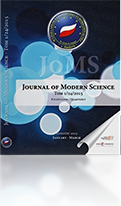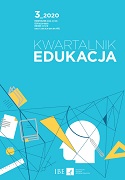Wiele zawodów – jedna waga? O zróżnicowaniu kosztów kształcenia zawodowego
Author(s): Jędrzej Stasiowski,Małgorzata Kłobuszewska / Language(s): Polish
/ Issue: 1/2016
Keywords: economics of education; school funding formula; vocational education costs; vocational education and training
W artykule podjęto problematykę publicznego finansowania edukacji zawodowej w Polsce. Na podstawie danych pochodzących z Systemu Informacji Oświatowej z 2012 r. przeanalizowano wydatki bieżące na ucznia w zasadniczych szkołach zawodowych i technikach. Wyniki analiz stawiają pod znakiem zapytania efektywność algorytmu finansowania szkół kształcących zawodowo w Polsce, który nie różnicuje wysokości subwencji w zależności od oferty nauczanych zawodów oraz sposobu organizacji praktycznej nauki zawodu. Może to mieć niebagatelne znaczenie w przypadku mniej zamożnych organów prowadzących szkoły. Jak wynika z analiz, wydatki bieżące na ucznia są zróżnicowane w zależności od obszaru kształcenia zawodowego. Istnieją istotne różnice w poziomie wydatków szkół kształcących w obszarze rolniczo-leśnym z ochroną środowiska w stosunku do szkół kształcących w mniej kosztownych zawodach z obszaru ekonomiczno-administracyjnego. Ponadto szkoły, które kształcą młodych pracowników oraz organizują praktyczną naukę zawodu poza placówką, np. w centrach kształcenia praktycznego, ponoszą istotnie niższe wydatki na ucznia niż pozostałe. Analizy ukazały również odmienne realia finansowania kształcenia zawodowego przez miasta na prawach powiatu i uboższe powiaty ziemskie. Zróżnicowanie wydatków jest wyraźniejsze w przypadku miast, które posiadają zasoby finansowe pozwalające na swobodniejsze kształtowanie wydatków w zależności od specyficznych potrzeb szkół kształcących w różnych zawodach. Oznacza to, że wydatki na kształcenie zawodowe bogatszych samorządów mogą stanowić lepsze przybliżenie realnych kosztów kształcenia w zależności od zawodu.
***
Public finance for vocational education in Poland (using an algorithm for the educational subsidy and its „vocational weight”) does not differentiate between costs of training for different types of occupation. The authors, using data from the Educational Information System (2012), analysed current expenditure per student attending vocational education – at technical upper secondary and basic vocational schools. This analysis questions the effectiveness of the finance formula for vocational schools in Poland, which does not differentiate allocation of subsidy between types of vocational training and organization of practical training at school. Findings indicated that current expenditure per student differed between types of training. For example, there were considerable differences in specialized school spending on training, leading to agricultural, forestry and environmental protection related professions, compared to schools training for economic or administrative occupations. Moreover, schools that educate adolescent workers and organize practical training outside school – e.g., the CKP (center for practical training) – have significantly lower expenditure per student. Analysis highlighted differences in the finance of vocational education between different types of local government – urban districts (town-poviats) and poorer districts (poviats). Variation was more pronounced in cities, which are generally richer and more flexible in their budgeting for schools according to specific needs. It can be inferred that expenditure of richer authorities on vocational training should describe a better approximation of the real costs of this type of education, depending on target occupation.
More...












